Alexander 2.15
Alexander the Great (*356; r. 336-323): the Macedonian king who defeated his Persian colleague Darius III Codomannus and conquered the Achaemenid Empire. During his campaigns, Alexander visited a.o. Egypt, Babylonia, Persis, Media, Bactria, the Punjab, and the valley of the Indus. In the second half of his reign, he had to find a way to rule his newly conquered countries. Therefore, he made Babylon his capital and introduced the oriental court ceremonial, which caused great tensions with his Macedonian and Greek officers.
Lord of all
Susa
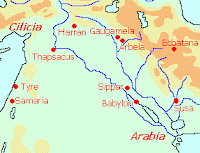
In March 324, Alexander reached Susa, the largest city in Elam and one of the capitals of the Achaemenid empire. As planned, he met his admiral Nearchus and the troops that had made the return voyage by ship. The stay at Susa was meant to be a holiday for Alexander, his officers and his men. For example, many valiant soldiers were decorated. Some received purple tunics. There were golden crowns for Nearchus, for Peucestas (who had saved Alexander's life in India), and for Hephaestion (whose most important merit was that he was Alexander's closest friend). Nobody objected, which comes as a surprise, because six years before, many had considered it outrageous that Alexander started to wear a diadem (above).
Unfortunately, the festivities were overshadowed by the death of Calanus. He had been with the Macedonian army since it had conquered India, and he had played an important role as Alexander's advisor. Now, he was old and wanted to die in an appropriate manner. A big funeral pyre was erected, and he burned himself alive, which was the Indian way to complete one's spiritual journey (text).
The Indian sage departed from life with the words "Alexander, we shall meet again in Babylon". Nobody understood why he said this, but the words proved true when Alexander died in Babylon (below). There may be some element of truth in the story, because the Akkadian name Bâb-ilî means "gate of the gods". Perhaps Calanus said something like "we will meet again at the gate of heaven", but was misunderstood by a translator.
To honor Calanus, funeral games were organized, and among these was a drinking contest in the royal palace. There were huge money prizes to be won, but of the drinkers, thirty-five died immediately after the match when they left the building and caught a cold. The winner, who had swallowed twelve liters of unmixed wine, and six others died a few days later.
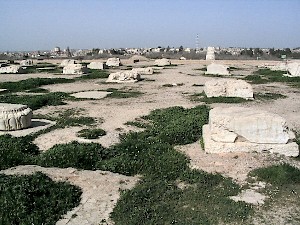
The greatest of the festivities in Susa was a marriage ceremony that lasted five days. Since Alexander had conquered Babylonia, Elam and Persia proper in 331/330, many Persian princesses had had a Greek education; now they were ready to marry Macedonian officers. Dancers, actors and musicians had come all the way from Greece to add glamor to the event.
Alexander married Achaemenid princesses from two dynastic lines: Barsine, a daughter of Darius III Codomannus, and Parysatis, a daughter of Artaxerxes III Ochus. Hephaestion married another daughter of Darius III, a young woman named Drypetis. Craterus was ordered to marry Amastris, a niece of Darius; Perdiccas married a daughter of Atropates; Artacama and Artonis, two daughters of Artabazus, were to marry Ptolemy and Eumenes. Nearchus was given the daughter of Barsine and Mentor, and Seleucus the daughter of the last leader of the Iranian resistance to the Macedonians, Spitamenes, a woman named Apame. As far as we know, only the last marriage did not end in divorce (text).
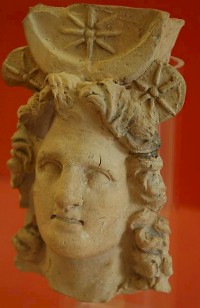
The marriages were concluded according to Persian rituals, and Alexander had given purple dresses to several Macedonian warriors. These were not the only Persian influences. The Persian royal bodyguard was reinstated. Hephaestion was appointed as chiliarchos, "vizier", and Ptolemy became Alexander's edeatros, "taster": both were Greek names for old Persian court functions. According to Aristobulus, the king wanted to be regarded as "lord of all". There is no reason to doubt this statement, especially since the title bears a strong resemblance to Persian royal titles like "king of all countries" and "king in this great earth far and wide". Several posthumous portraits present Alexander as kosmokrator, "ruler of the universe".
The Persian court rituals and the forced marriages did not much to improve the relations between Alexander and the Macedonian elite. Even worse was to come: a corps of 30,000 young Bactrians (above) arrived in Susa. They were trained to fight in the phalanx, and were called the Epigonoi, the "successors". This strongly suggested that Alexander wanted to replace his Macedonian infantry. Moreover, Iranians were allowed to enter the ranks of the Companion cavalry (which had suffered heavily in the Gedrosian desert). The rank and file of his army felt brushed off.
Opis
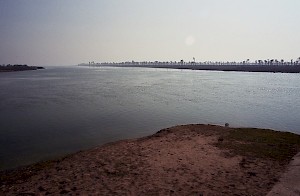
Meanwhile, the army had to move on. Ships carried the soldiers from Susa to the Persian Gulf and upstream along the Tigris. At the mouth of this river, Alexander founded his last city: a town named Karkâ (Aramaic for "fortress") was rebuilt and settled with veterans. It was later known as Charax and has been found near Al Qurnah in Iraq. At the same time, Alexander removed several artificial barrages that had been built by the Persians as a defense against an attack by ships, and improved the Pallacottas canal (Akkadian: Pallukatu), the most important water work in Babylonia. This shows that Alexander wanted to increase traffic and trade in the Persian Gulf and wanted to develop the Babylonian agrarian sector. He also sent out reconnaissance expeditions that had to prepare the way for a naval expedition to Maka and Arabia (Yemen).
Alexander's stay in Asia had lasted twelve years. The older soldiers of his army, people who had been in their thirties when they left Macedonia, were now unfit for service, and had to be pensioned off. When the army had reached Opis, Alexander announced that they were permitted to go back home and that they would receive a reward that was to the envy their friends back home.
The announcement cannot have surprised the soldiers. After all, they had already seen the Iranian Successors. Yet, they were shocked: it looked as if their king had now really become a Persian, commanding an Asian army. Was this the result of their fighting against Persia, to see a new, strong Persian king in the end? Alexander tried to convince them that their sons would soon be fighting on his side and that there was no need to fear that he was becoming a Persian despot, but the soldiers were too frustrated. They had seen how Alexander wore an oriental dress, that he had introduced proskynesis, that he was building an army of Asians. Even though they longed for their homes, their wives and their children, they felt rejected.
This was more than a mutiny, it was a clash between the Macedonians and what they regarded as the Orient. The soldiers shouted personal insults ("fight your wars with your father Ammon!"), and Alexander was unable to reply. Some of his soldier's criticism was correct: it was true that he was becoming an absolute ruler who felt uneasy when his men spoke with their usual frankness. He thought that they were challenging his royal authority, ordered thirteen soldiers to be executed and dismissed his European soldiers. They could go home if they wanted to, he did not need them any more.
Immediately, he transferred their military functions to the Successors. This confirmed the Macedonians' worst fears, but now it was too late: their commander was threatening to use the conquered against the conquerors. We do not know how much of Alexander's threats were bluff. But he played a dangerous game. If the soldiers did not apologize, he would be forced to do what he had announced. However this may be, it worked: in the end, the Macedonian soldiers apologized.
Now, it was Alexander's turn to show kindness. He called the Macedonians his relatives and announced a large banquet, where the reconciliation was to be celebrated. The table arrangements are very interesting. In the middle was Alexander, probably with his closest friends and the most important commanders; in a wider circle were the Macedonians; the Persians were sitting in an outer circle; other people - Carians, Phoenicians, Egyptians, Babylonians, Dahae, Indians - were sitting on the periphery. Then, Alexander, the Greek seers and the Persian Magians poured the ritual libations and Alexander prayed for future harmony and partnership in rule between Macedonians and Persians. All 9,000 guests repeated this prayer (text).
This is highly significant. The "partnership in rule" meant that the Iranians were to be the backbone of Alexander's army, and the Macedonians were to be administrators. We have already seen above that Alexander had already started a policy to appoint Europeans as satraps.
Almost immediately, 10,000 veterans infantry men and 1,500 cavalry were demobilized. Craterus was to lead them back home and to replace Antipater as commander of the Macedonian forces in Europe. Now, the last advocate of the old Macedonian values was sent away from court for good. Antipater was ordered to bring reinforcements to Babylon.
The Decree on the exiles
At the same time, Alexander's decree on the exiles became known in Greece (it was promulgated during the Olympic Games). The Macedonian king ordered that all exiles in Greece had to return home. It is questionable whether he was entitled to do this, even though he was the leader of the Corinthian League. The result of his decree was that in nearly all Greek towns civil discord flared up - something that may have been intended, to give Alexander an excuse to intervene and tighten his grip on the Greek towns. The Athenians even prepared for war, and implemented their plans immediately after Alexander's death (text).
The death of Hephaestion
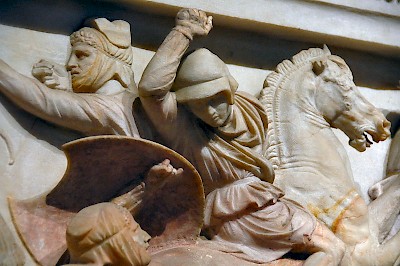
In the autumn, Alexander went to Ecbatana (modern Hamadan), the capital of Media and a vital link on the road between the western and eastern satrapies. The satrap of Media, Atropates, entertained his Macedonian overlord. However, Alexander was not to spend a happy time in Ecbatana. After one of the usual sessions of heavy drinking, Hephaestion fell ill. Seven days later, Alexander's former lover and closest friend was dead.
As was to be expected, Alexander was devastated. He ordered the execution of Hephaestion's doctor, fasted for three days, cut his hair and ordered the tails of the military horses to be clipped. An embassy was sent to Siwa, to ask Zeus Ammon what kind of burial he wanted Hephaestion to have.
According to Diodorus of Sicily, the lord of all also "proclaimed to all the peoples of Asia that they should quench what the Persians call the sacred fire, until such time as the funeral should have ended". This was a mistake too, because it was a Zoroastrian custom to quench the fire at the death of the king. What Alexander had in fact announced was his own dead.
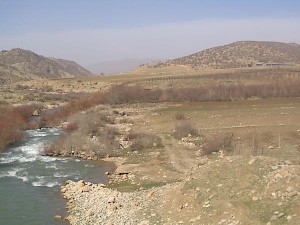
After a brief campaign against the mountain tribe of the Cossaeans in the Zagros range, who were forced to give up their nomad lives and settle in towns, Alexander went to Babylonia. It was now winter, the beginning of the year 323, and the Greek world received orders to worship the Macedonian conqueror as a god.
The request was unusual, but not an unheard-of idea. Alexander's father Philip had once ordered his own throne to be placed between statues of the twelve Olympian gods and several Greek commanders (e.g., the Spartan Lysander) had received sacrifices. The Greeks and Macedonians believed that sometimes, human beings could be more powerful than the god, for example when prayers to the gods had not ended a food crisis and the help of a king had. Besides, they knew many myths about mortals who had become gods (e.g., Heracles, Ganymedes, Adonis).
The request was taken seriously by most cities, but did alienate the Greeks even more from the man who had already caused great tensions in their towns by ordering the return of the exiles. In the summer, Alexander had offended his soldiers, in the winter he created troubles in Greece. Having lost his best friend, he was becoming very lonely.